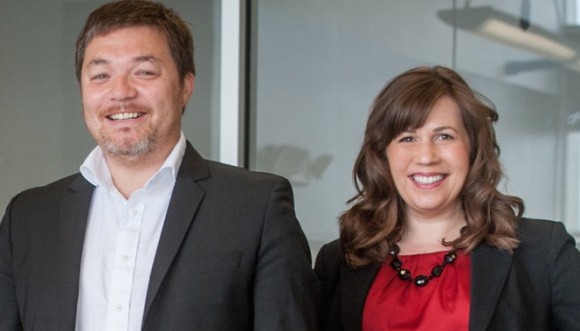Boston startup Orig3n has been showing up at marathons and triathlons with an unusual request for participants: How about parting with a vial of blood? The company is trying to build a giant library of iPS cells — that’s induced pluripotent stem cells — and they’ve found that amateur athletes tend to be more willing to share than most.
“People are sometimes a little nervous, but there’s this altruistic feeling of contributing to something larger than yourself,” said Sarah Salbu, director of communities at the company. At a recent marathon in Louisiana, Salbu said her team ran out of sample collection tubes.
The iPS cells from the blood samples can then be cultured into different types of cells: heart cells, brain cells, liver cells. Orig3n’s vision is that having a broad range of diverse cells will be useful to biopharma companies that need to test new drugs and gene therapies, showing what works and what doesn’t better than today’s methods, which often use mouse cells or one kind of human cells.
bloodsamples“We think it can reduce the failure rate for pharma and biotech companies,” said CEO Robin Smith, a serial entrepreneur who sold his last company to lab equipment giant PerkinElmer in 2011. “A lot of times, especially with neurological disorders, when they’re using a mouse brain model, things look great in the lab and in pre-clinical tests, but they crash when they get real patient diversity in humans. We can give these companies reproducible and controlled access to certain populations of individuals, on a plate for screening.”
Orig3n plans to announce today that it has raised $3.1 million from a group of investors including Hatteras Venture Partners, Harris & Harris Group, Korea-based KTB, Mountain Group Capital, and an unnamed strategic investor.
Smith said he senses the most interest in Orig3n’s cell libraries from companies working on treatments for cardiac and neurological conditions like Long QT syndrome, a rare kind of arrhythmia; Parkinson’s disease; multiple sclerosis; and Amyotrophic lateral sclerosis, or ALS.
But in addition to peddling cells to biopharma companies and academic labs conducting research, the company is also offering consumers two paid ways to store their iPS cells, which Orig3n has dubbed Life Capsule. One, for $299 a year, is a way to contribute to research and get information about how your cells are being used, but also be able to “check out” a sample of your healthy cells at a later date. The premise is that if you get sick, there may be a way to use those healthy cells to test a customized therapy that will be most effective for you — without engaging in trial-and-error tests on your actual body, as often happens today. That investment is a bet on regenerative medicine making some significant advancements in the coming years. Smith explains that being able to “grow your heart cells outside your body” could provide a way to “dial in a treatment plan that is tuned to you in a very personalized way.”
Orig3n has nine employees. The company licenses a key technology for spurring iPS cells to become different types of cells from iPS Academia Japan. Salbu said you’ll find the company at the Boston Marathon this April — once again looking for volunteers.








Leave a Reply
You must be logged in to post a comment.